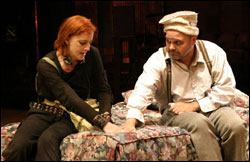HOMEBODY/KABUL
Intiman Theatre, Seattle Center, 206-269-1900. $10-$42. 7 p.m. Tues.-Sun.; 1 p.m. matinees Sat.-Sun. and Wed., Oct. 8. Ends Sat., Oct. 11.
The most stunning theatrical masterpiece I have seen since Three Tall Women is the hour-long first-act monologue of Homebody/Kabul, in which a dottily romantic Englishwomanthe Homebody (Ellen McLaughlin), a character partly inspired by Kushner’s momreflects “elliptically and discursively” (as she self-deprecatingly puts it) on Afghan tribal strife (from 3000 B.C. to 1998), her no less fractious family, and her own idiosyncratic mind. She reflects on her reflections; her crypto-Nabokovian mania for sesquipedalian arcana; her recent dinner featuring festive Afghan party hats; her erotic fantasy of getting fisted by the seven- fingered Afghan-hat salesman; and the reflexively self-abnegating, Whitmanic-impressive song of herself that constitutes her character.
The monologue is a modernist collage whipped up by a whirlwindthe voice of the vortex; Yahweh and tentative yenta; flirty schoolgirl and dry, droll, drawing-room-comedy Jeremiah. It is an opportunity for an actor to fly or fall on a grand scale; the magnetic McLaughlin, who played the Angel in every American production of Angels in America, makes it resonant, heaven-sent.
Kushner is typically compared with Tennessee Williams, and he does mine the mother lode in ways that bear poetic comparison with The Glass Menagerie, also Albee and O’Neill. Yet the hiccupping syncopation and funny, vital nihilism of his monologues remind me more of Beckett. His political polemics descend from Shaw and Brecht, but his scatterbrain lacks their logic: The way his talkers are carried off on a runaway train of thought has a giddy Preston Sturges air.
Alas, the air gets thinner. After the Homebody part, the play famously goes to hell for three more hoursthat is, to Kabul. In place of the vanished, irresistible matron teasingly spinning her narrative dance of the seven veils, we meet her blunt, punkish, repulsively braying daughter Priscilla Ceiling (Kristin Flanders) and blubbering techno-nerd businessman husband Milton Ceiling (Laurence Ballard). To soar past the Ceilings who kept her down, the Homebody has flown to Afghanistan for a new life.
Possibly a new death: A gruff Afghan doctor (Shanga Parker) tells the Ceilings their homebody has been torn limb from limb. Or maybe she’s alive, married to the Muslim mob, incommunicado. Led by a whimsical guide (puckish Ismail Bashey), who’s either a spy or an Esperanto poet, and menaced by Taliban thugs, Priscilla hunts for her mom while Milton drifts off on an opium cloud with Quango Twistleton (Simeon Moore), an expatriate English junkie who likes to wank with Priscilla’s unmentionables. They encounter the land-mined grave of Cain, the biblical alleged founder of Afghanistan, and smuggle a polyglot librarian (Jacqueline Antaramian) past the border.
Despite intermittently inspired scenes and lovely lines performed by first-rate actors (especially Ballard), no character or event intelligibly connects with any other. Priscilla’s character makes no sense. The play is all about diverse languages colliding without communicating, but the Kabul part is a fascinating scramble of half-baked ideas, furtive associations. The opening monologue brilliantly articulates failed communication; the rest of the play is a failure to communicate. TIM APPELO
 MEASURE FOR MEASURE
MEASURE FOR MEASURE
Seattle Center House Theatre, Seattle Center, 206-733-8222. $12-$24. 7:30 p.m. Thurs.-Sat.; 2 p.m. Sun. Ends Sun., Oct. 12.
“There is so great a fever on goodness that the dissolution of it must cure it.”
Well, ’tis a timely line, the Duke’s, and God save us all. The Bard’s dramatic bulk always provides a heady milieu both broad and specific enough to transport the action easily through time, landing here and there for a rich interpretive reckoning with Nazis, gangbangers, orin the instance of Seattle Shakespeare Company’s new productionthe randy denizens of Vienna circa 1949. Recall the moldering, shadowy setting of Orson Welles’ The Third Man, and you get the drift. The Vienna of Freud and Klimt has spilled its cups, exchanging a cultural buss on the cheek for a bawd’s slap on the ass. Too dark for romantic comedy, yet ultimately bloodless and restorative, this midperiod Shakespeare might best be defined as political satire with a hard-on for hypocrisy.
Both of the leads here give strong performances. Mary Jane Gibson is creepily intense as Isabella, the would-be nun faced with the choice of sacrificing her body to save her condemned brother’s life. Gibson’s beautiful oval of a face, her hair pulled tight under her habit, perfectly reflects the electrifying anguish of untested idealism confronting the lowest depths of human abasement. And Paul Morgan Stetler is riveting as the iron-fisted, libido-tormented Angelo. Tight-lipped, his voice straining and his face a dynamo of internal conflict, Stetler is utterly convincing in his Mussolini-like portrayal of political perversion. In their complex negotiations over the two sides of idealism’s tarnished coin, Stetler and Gibson grant this production a disturbing energy.
Director Stephanie Shine amplifies the play’s decadent sense of over-ripeness and anomie, allowing the laughs to come though with the winking gestures of sexual farce; at the same time, she never loses focus on the essentially moral character of the drama. In the end, the tension resides in the way oppression springs from repression, as the ideologue’s libidinal desires are perverted into a lust for order. Given a jazzy, sepia-toned tinge, SSC’s production offers a disturbing meditation on the fascistic underpinnings of power while also poking fun at the hypocrisy of high ideals. RICK LEVIN




